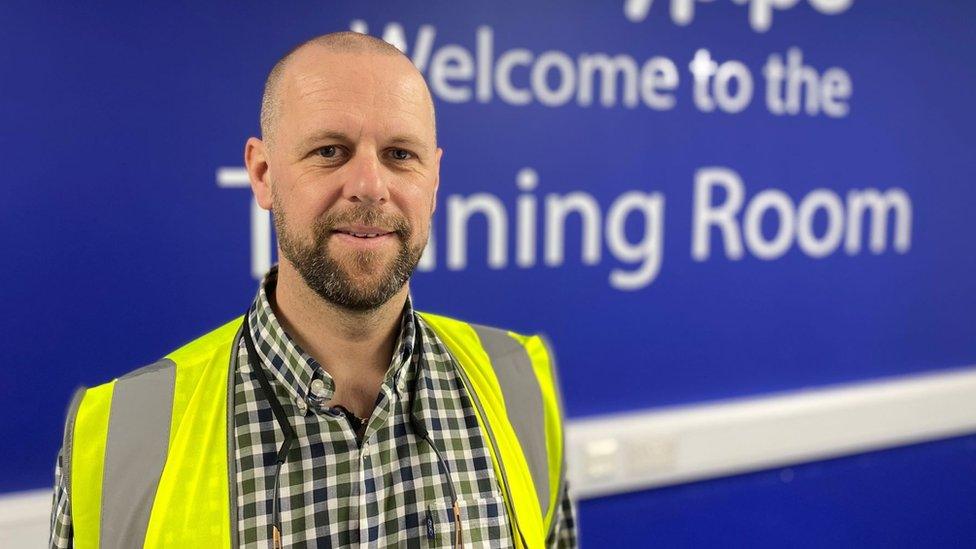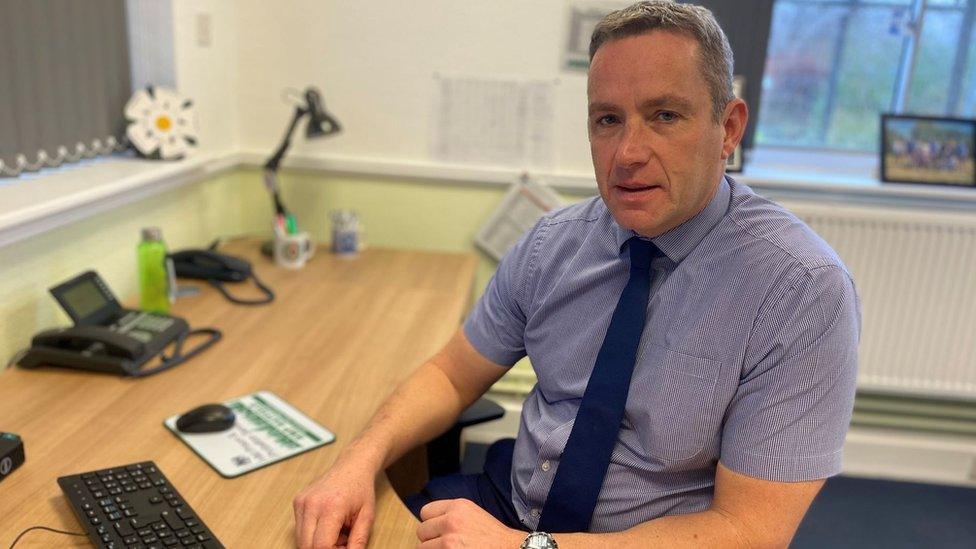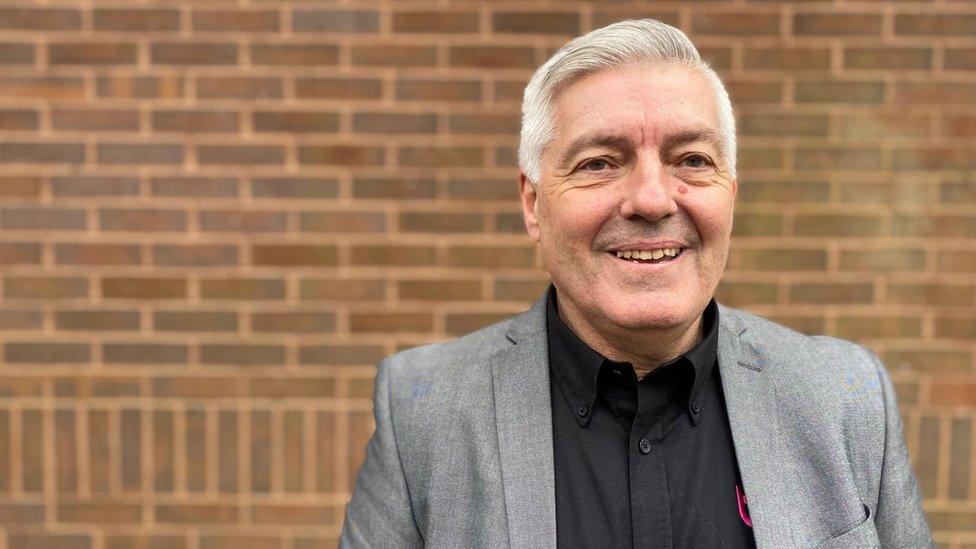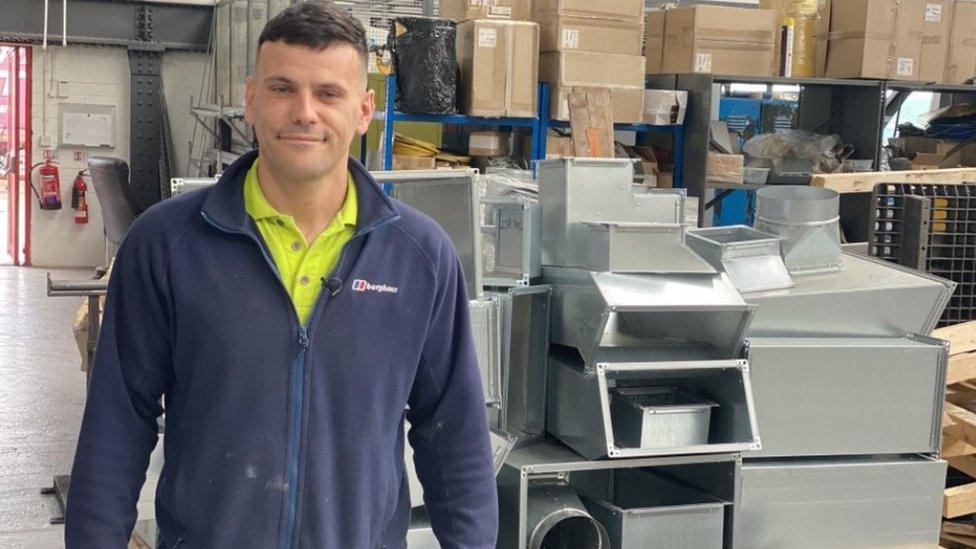Leeds charity helping prisoners back to work goes national
- Published

The Tempus Novo charity first began its work at HMP Leeds in Armley in 2014, but has since grown
A Leeds charity which supports prisoners and ex-offenders into employment has now expanded its work across the country.
The Tempus Novo charity began helping prisoners at HMP Leeds in Armley in 2014, working with employers who had unfilled vacancies.
But last year, it partnered with Sheffield Hallam University to develop a business model which could be used to expand its reach beyond its home city.
Since then, Tempus Novo has been working with prisons in South Yorkshire, North Yorkshire, Derbyshire, Buckinghamshire, Cheshire and Middlesbrough - and this year expects to help its 1,000th person.
The BBC has been to South Yorkshire to talk to just some of those involved.
'Paying back into the community'

Dave, a prisoner at HMP Hatfield, says getting work thanks to Tempus Novo is a "win-win" for him and the community
Dave is currently serving a sentence for drug-related offences at HMP Hatfield in Doncaster, a Category D men's prison that holds over 350 inmates.
It is an open prison with minimal security and allows eligible prisoners to spend time away from jail on licence - this can be for work, education, or as part of their resettlement.
Around 120 prisoners at HMP Hatfield get paid work in the community on a daily basis.
With the support of Tempus Novo, Dave has been working for about six months as a full-time machine operator at a local company called Polypipe.
He says he plans to continue in this job after his release from prison and even until he retires.
"I like where I am, I like the company," he says.
"Everybody knows where I'm from and what I'm about, and nobody's been bothered.
"We're all in prison for doing something wrong, but we've come out, we're now paying our taxes, we paying back into the community.
"We pay a levy [from salaries] that goes on victim support, so it's a win-win situation for everybody."
'They get back into normal society'

Karl Drury, from Polypipe in Doncaster, says it has been "fantastic" to work with prisoners from HMP Hatfield
Karl Drury, from Polypipe, where Dave works, says he was initially nervous about employing prisoners.
However, he says that all those involved go through the same interview process as any other candidate and have been "fantastic" to work with.
"I don't know what it's like being in prison, but I'm assuming it's not the best place to be," he says.
"Rather than being sat in a cell or even in the rest of the prison where they're out mixing with other prisoners, at least they can get back into what they class as normal society."
'Employers can't fill positions'

Michael Mills, HMP Hatfield governor, says offending rates reduce "massively" for those involved with the charity
Michael Mills has been the governor at HMP Hatfield for four years.
Mr Mills, who joined HM Prison Service 31 years ago, says offending rates reduce "massively" when prisoners are in sustainable, full-time employment.
He adds: "It's not that we're taking jobs from other people in the community, employers are coming to us because they can't fill positions."
"At any one time now, we'll have 40 to 50 prisoners working under the Tempus Novo umbrella," he adds.
"They provide that wrap-around support between us and the employer.
"And importantly, when the prisoners get out, Tempus Novo resettlement workers continue to provide that support for up to 12 months.
'No job for love nor money'

Valdemar Wawrosz says the charity has approached the government for £1m extra funding
Tempus Novo was set up by former prison officers Steve Freer and Valdemar Wawrosz.
Mr Wawrosz says prisoners often struggle to get employment.
"You'd see them going to work in a hot sweaty kitchen, six or seven days a week, 12-hour shifts.
"I'd say to them, 'why can't you do this on the outside?'
"The stock answer coming back from them was, 'I can't get a job for love nor money with a record like mine'."
Mr Wawrosz says out of nearly 1,000 placements, only 37 people have returned to custody within a two-year period.
According to figures from the charity, it costs £3,500 per year to support an ex-offender in employment, whereas offenders cost the government £46,600 per year in prison.
Mr Wawrosz says the charity has approached the government, seeking £1m funding.
"I can't see that happening, but it'd be really welcome if they could and it would help such a lot of people."

Follow BBC Yorkshire on Facebook, external, X (formerly Twitter), external and Instagram, external. Send your story ideas to yorkslincs.news@bbc.co.uk, external.
- Published30 August 2023
